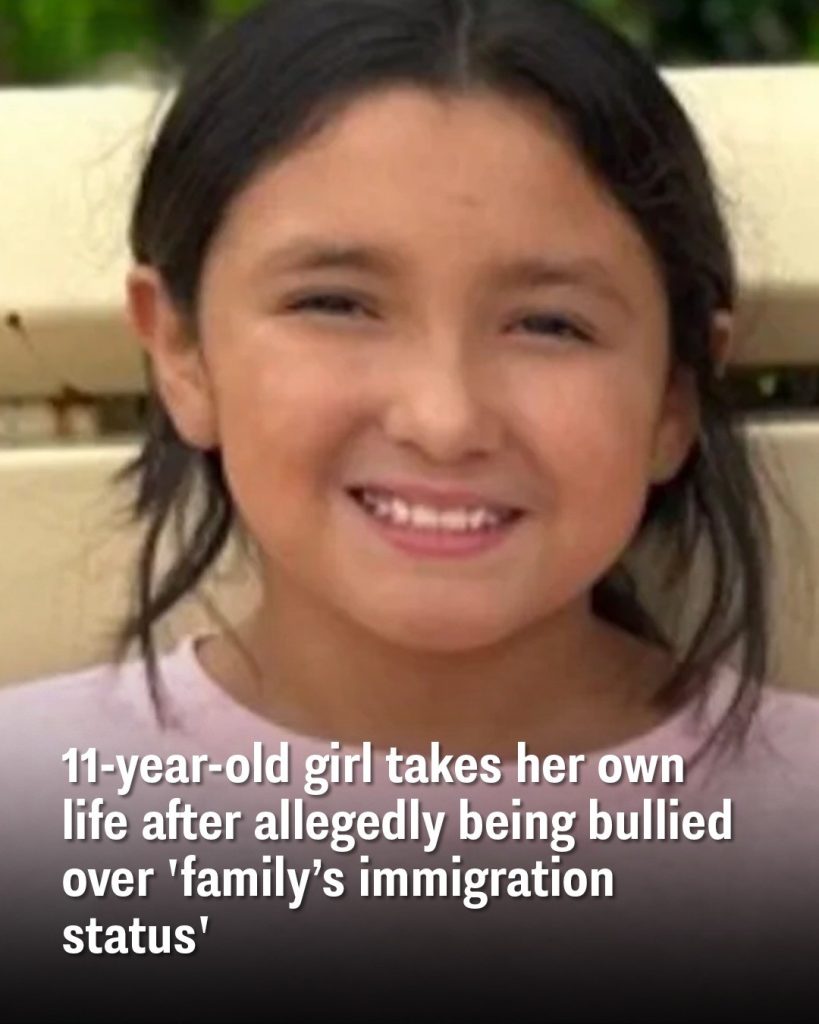In an incident that has shocked and saddened many, an 11-year-old girl tragically took her own life after reportedly facing relentless bullying at school. The bullying was allegedly centered around her family’s immigration status, exposing a deeper issue of intolerance and systemic bullying that is all too common in many educational environments.
The Heartbreaking Incident
The young girl, whose life was cut tragically short, was described by her family and friends as a bright, caring, and gentle soul. She loved her family, enjoyed school, and had dreams for the future. However, her life took a tragic turn when she became the target of bullying at school. Reports indicate that her classmates made derogatory remarks and comments about her family’s immigration status, a topic that is already fraught with fear and anxiety for many immigrant families.
Family’s Pain and Community Outcry
Her devastated family has spoken out, sharing their heartbreak over their daughter’s death. They described her as a light in their lives and emphasized the profound emotional toll the bullying had on her mental health.
“She was our world. No child should ever have to endure what she went through,” her parents said in a public statement. “We hope no other family has to suffer this kind of loss.”
Community members and local organizations have rallied around the family, offering support and demanding action. Candlelight vigils, marches, and social media campaigns have been organized to bring awareness to the dangers of bullying and discrimination in schools.
Bullying and Immigration: A National Issue
Bullying is a pervasive issue in schools across the world. When compounded with sensitive topics such as race, ethnicity, or immigration status, it can escalate into dangerous levels of emotional and psychological harm. Immigrant children often face unique challenges, including language barriers, cultural differences, and fear of discrimination. For children in mixed-status or undocumented families, the fear of being targeted or ostracized is a harsh reality.
According to a report from the National Center for Educational Statistics, over 20% of students in the U.S. report being bullied. However, for children in minority and immigrant communities, the numbers are even higher. This tragic case sheds light on the urgent need for more robust anti-bullying policies that specifically address the unique vulnerabilities of marginalized children.
Calls for Systemic Change
Activists, educators, and policymakers are using this tragedy as a wake-up call. Many are calling for stronger anti-bullying initiatives, culturally sensitive education programs, and mental health support in schools. Several advocacy groups have already petitioned local school boards to implement mandatory training for educators on recognizing and addressing bullying related to race, ethnicity, and immigration status.
“It’s not enough to have a zero-tolerance policy. We need to actively create safe spaces for all students,” said a spokesperson for a local immigrant rights organization. “Children should feel accepted and supported, not judged and isolated.”
Addressing Mental Health and Suicide Prevention
This tragic incident also highlights the urgent need for mental health awareness and suicide prevention programs in schools. Children who face bullying often experience anxiety, depression, and feelings of isolation—factors that can increase the risk of suicidal thoughts.
Parents, educators, and peers all play critical roles in recognizing warning signs and offering support. Open communication, active listening, and creating an environment where children feel safe to express their struggles are essential steps toward prevention.
Organizations like the National Suicide Prevention Lifeline and the American Foundation for Suicide Prevention offer resources for families and schools to help identify at-risk youth and provide support during difficult times.
Moving Forward with Compassion and Action
While no action can bring back this young life, her story serves as a painful reminder of the consequences of unchecked bullying and discrimination. Schools, communities, and families must come together to build more inclusive, compassionate spaces where children can thrive without fear of judgment or harm.
As the family grieves and the community mourns, it is incumbent upon society to ensure that this tragedy sparks meaningful change. Every child deserves to feel safe, valued, and loved—no exceptions.
Resources for Those in Need
If you or someone you know is struggling with bullying, mental health challenges, or suicidal thoughts, help is available:
- National Suicide Prevention Lifeline: Call 988 or visit their website for 24/7 confidential support.
- StopBullying.gov: Provides resources and information to help prevent bullying.
- Crisis Text Line: Text HOME to 741741 to connect with a trained crisis counselor.
Together, we can create a future where no child feels that they have no way out. Let this young girl’s story be a catalyst for empathy, action, and change.


